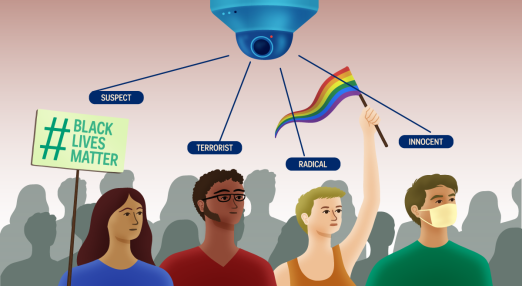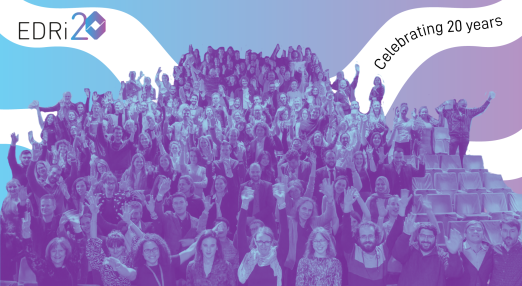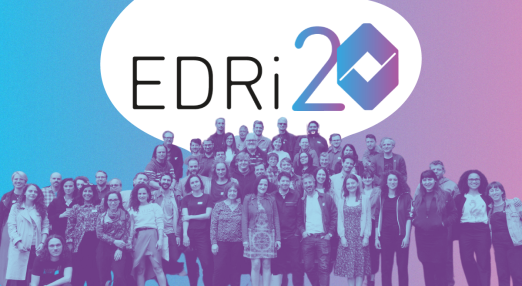Information democracy
Powerful companies and governments control the way the internet and new technologies are deployed. These actors blur the lines on corporate power in ways that have tremendous impact on people and democracies. The dominant business model of ‘Big tech’ platforms is based on surveillance, polarization and power imbalances. This ‘surveillance capitalism’ has had a global impact on democracy. For example, state and private actors can use the internet and technologies to spread political disinformation, to manipulate electoral results, to attack human rights defenders and to limit civic space.
Filter resources
-

EDRi-gram, 12 July 2023
Keeping up with the fast-paced digital rights world is hard work, so we’re taking a well-deserved summer break. But there’s lots to update you on before we go. In this EDRigram, you can read about the ongoing efforts in the EU and the UK to protect encryption and keep the safety and integrity of everyone’s private communications intact. You can also read about what EU’s plans to digitise travel documents could mean for you – more convenient travelling or more discrimination? Since this is the last edition of the EDRigram before we break for the summer, we have an extended recommendation section to keep you from from missing us while we’re away. Have a great summer!
Read more
-

EDRi-gram, 28 June 2023
Recent developments in crucial digital European Union regulations have raised many eyebrows as we see attempts to undermine human rights. 27 civil society organisations, including EDRi, stood against the use of people's sensitive information to target them with political messages online. 65 civil society and journalist associations also urged the Council of the European Union to ensure stronger safeguards to protect journalists in the European Media Freedom Act. In this edition, you can also read about how digital rights are a civic space issue and why privacy is not a crime.
Read more
-

Digital rights for civil society and civil society for digital rights: how surveillance technologies shrink civic spaces
Digital technology has transformed civic spaces - online and offline. In our digital societies, characterised by injustice and power imbalances, technology contributes to shrinking civic spaces. And to defend civic spaces against surveillance, we need strong and resourced civil society organisations and movements.
Read more
-

Open letter: EU Lawmakers must uphold human rights to privacy and free expression in the Political Ads Regulation
EDRi and 26 civil society organisations, voice our deep concern regarding the worrying developments related to the Regulation on the Targeting and Transparency of Political Advertising.
Read more
-

EDRi-gram,14 June 2023
It’s getting hot in here – and we don’t just mean the weather. By the time this EDRi-gram reaches your inbox, the EU Parliament will have voted on the AI Act and the "e-Evidence" package. This is a crucial moment for the AI Act as we push hard and keep our fingers crossed for all the wins of the committee vote to remain after the plenary. We also have serious concerns about the e-Evidence proposal posing a threat to our fundamental rights. Along with other civil society groups, doctors and journalists organisations and internet service providers, we are calling on Members of European Parliament to reject this package. In this edition you can also read about what changed in the ten years since Snowden’s revelations about mass surveillance by the US government.
Read more
-

EDRi-gram, 31 May 2023
Here is what happened since we last touched base. The EDRi network met in Belgrade for our General Assembly. We strategised, got updates from national members about the state of #DigitalRights, and enjoyed personal connection time. A BIG welcome to EDRi's newly elected Board members: Andrej Petrovski, Director of Tech at EDRi member SHARE Foundation, and Isabela Fernandes, Executive Director of TOR Project. In the last fortnight, we also celebrated 5 years of the General Data Protection Regulation. The anniversary was marked by the €1.2 billion fine for Meta issued thanks to EDRi member noyb's work. The decision required 10 years and 3 court procedures against the Irish Data Protection Commission, which shows the need for better GDPR enforcement.
Read more
-

EDRi-gram, 17 May 2023
Last week, European Parliament committees voted to protect people’s rights in the AI Act. In a landmark moment, Members of Parliament (MEPs) supported all key civil society demands. We’re still concerned about some gaps and loopholes but it’s a big win for our network and partners’ work! The PEGA committee also adopted its final report and recommendations. It included many valuable proposals but failed to go all the way in calling for an EU-wide ban on spyware. You can also read our take on what’s missing from the EU Digital Decade report (spoiler alert: our rights).
Read more
-

EDRi-gram, 3 May 2023
This week, as the EU Parliament gets ready to vote on the AI Act, we are urging members of Parliament to protect people’s rights in this landmark legislation. We are putting forward our recommendations to lawmakers on protecting journalists from all kinds of surveillance through the European Media Freedom Act. Among other digital rights updates, read about how Irish and French Parliamentarians have become the latest voices to sound the alarm against monitoring of people’s messages in the proposed Child Sexual Abuse Regulation. You can still share your feedback on the draft programme for an initial decolonising process for the digital rights field in Europe.
Read more
-

EDRi-gram, 19 April 2023
In this edition of the EDRi-gram, we are inviting you to share your feedback on a draft programme for an initial decolonising process for the digital rights field in Europe. Multiple voices are raised against the EU CSAR proposal amidst plans revealing the wish to systematise government access to data. We are also looking at why it's important to uphold patients’ rights in a new health data law. And what are the consequences of the recently adopted Law on Olympic Games in France, which formalises the introduction of algorithmic video-surveillance.
Read more
-

A collective project: EDRi celebrates turning 20 in the capital of the EU
On 21 March, we celebrated EDRi 20th anniversary in Brussels, the heart of the European Union. Close friends and supporters gathered at Bozar, the Center for Fine Arts, for a fun and dynamic evening celebrating the networks's collective work for far, current efforts and a hopeful future.
Read more
-

Shaping the next 20 years of digital rights in Europe
Last week we celebrated the 20th anniversary of EDRi, the European Digital Rights network, and its two decades of defending and promoting rights online and off. The digital rights movement has come a long way and we are at a crucial moment to shape our shared digital future for the better. The EU’s fundamental rights framework has been pivotal in our achievements so far, but it has never served everyone equally. How can we better equip Europe for the human rights challenges of the digital age?
Read more
-

EDRi-gram, 29 March 2023
Last week, with a close circle of friends and supporters in Brussels, EDRi celebrated twenty years of defending and advancing digital rights across Europe. It was an evening full of reflecting on our journey and successes and also building hope and strategies for the future of Europe’s digital rights movement. A huge thank you to everyone who joined us for making the celebration truly special! In this edition of news from the digital rights world, read about a new Brussels-focused campaign against mass facial recognition. Residents of the Belgian capital can join the initiative and demand that the Brussels Parliament bans these intrusive and discriminatory practices. We also explore the concerning revelation that unverified information such as “social media profiles and phone contacts” are being used for the purpose of deportations, according to an internal European Commission assessment.
Read more
